
Atlas F1 Editor in Chief
At the age of 67, Pierre Dupasquier is the longest running worker for the Michelin company. He is also one of the most senior members of the Formula One paddock, with a rich personal history in the sport. As his dinner with Biranit Goren reaches its end, he tells her about the past, but also about his nearing farewell... Exclusive for Atlas F1
Dupasquier was moving up the company ladder, and in 1973 he was appointed the head of the competition department. Despite excursions in the 1990s - including a promotion to vice-president of product development for Michelin USA - he's been identified as Michelin's racing man over the last 30 years, and the driving force behind their various motorsport programmes.
BG: My impression is that Michelin would not be in Formula One today, if it wasn't for you; that this is something you wanted and therefore convinced the company to do
Dupasquier: "Ehhh... that's what Mr. Michelin says. I disagree because, yes, I kept... I had so many... We went to Formula One the first time just to bring, against the bias of Goodyear, the radial concept of Michelin, and we won with everyone - with Ferrari, McLaren, Brabham, and so on. The life I had at that time was so good, that I kept my friendship with those people - with Bernie [Ecclestone], with Ron Dennis, Frank Williams. In the 1990s, when I came back from the United States to take care of the whole racing department of the company, Frank called me every year to say 'hi, how are you doing? When are you coming back?' So we kept the relationship.
"And then, Mr. Tomita of Toyota came to the last WRC race they did as a car factory team - he called me, he had a small caravan, and he said 'sit down, I will tell you something very confidential. We have decided to go to Formula One, Toyota, as a company, and I would like you to come with us.' Oops! That's the way it began. I did not push; I was interested, I kept alert on what's going on in Formula One, but nothing that... I knew that Formula One is a pain the ass, I knew it already. So going back? Hrmm.... the risk for a company is significant. Particularly when you are in a dominant position like Michelin.
"Our friends from Kumho (Korean tyre company) just claimed last month that they will come into Formula One in 2007. Fine. What have they got to lose? Zero. The fact they announce that they have the guts to go to F1 in the future, soars their shares up to the sky. They gain everything from that. But Michelin could just lose things, that's why I was not pushing for our return. But after the request of BMW, in addition to Toyota, the management said that it was something to do."
BG: Do you find your Formula One comeback a disappointment so far?
BG: OK, I'll ask differently - why do you stay in Formula One?
Dupasquier: "Because people still want us."
BG: Forget them, why does Michelin want to stay?
Dupasquier: "We came into Formula One because we've been asked by Toyota and BMW - and after that Ford, Renault, McLaren, BAR-Honda and now Sauber and Red Bull - to supply them with tyres, and that's what we are doing. And they still ask for our tyres."
BG: Some of your teams pay for their tyres, but I'm guessing that whatever they pay does not cover what you spend on F1
Dupasquier: "No, sure, but being in Formula One gives us a huge visibility as well - we needed it."
BG: Can you give me a ballpark number how much Michelin spends in F1?
Dupasquier: "If I tell you how much it costs, I have to tell you how much we get from it."
BG: Yes, and I want to know that too...
Dupasquier: "Well, I can tell you this much: we are making money."
BG: You're in profit?
Dupasquier: "Yes."
BG: How do you do that math?
Dupasquier: "Increased sales, contracts with car manufacturers, second equipment - when you have a BMW or Mercedes or Renault, whatever, coming with Michelin tyres. The more prestigious the car is, the more trust the customer has on the decision of the car manufacturer [regarding which tyre to use]. So when you buy a small car, you change tyres and don't care which brand. When you get a Porsche or a BMW or a Jaguar, when you change your tyres you tend to go with the manufacturer's recommended brand and model. We have been very conservative with our evaluation but definitely being in Formula One is profitable for us."
BG: How would you compare the expense of being in F1 for you, compared to MotoGP or Rally or any other motor racing?
"We just like to do that, and it's not that different - it's the same thing. We got into Motorcycling because Barry Sheene exploded a tyre and said 'I need Michelin tyres'. So my guys called me and said 'a guy called Barry Sheene says he needs Michelins' - I said, 'oh hell, don't move!' and took my car and drove like hell to Imola, where they were, and brought him tyres.
"Rallying was because we began to work on solutions and we built a partnership based on finding solutions. That was the idea, that was always the idea - to try and find solutions and understand."
BG: So does Michelin as a company hold an evaluation every certain amount of time, whether to stay in Formula One or leave?
Dupasquier: "Yes, absolutely yes. The board members come to us with questions and we try to feed them with everything - give them the understanding of what's going on and the risk involved."
BG: You mentioned that being in Formula One is profitable for you. Let's say you look at the Michelin sales of the fourth quarter in 2004 and you see they dropped. Can you tell if it's related to your performance in Formula One or not?
Dupasquier: "Well, we do surveys and stuff. But you have to believe in something and have good sense."
BG: Well, I remember when Ford bought Stewart and renamed it Jaguar, the Jaguar car sales went up - it was really good for their marketing. And I'm wondering if initially being associated with F1 is good marketing, but after a while without results it begins hurting you
Dupasquier: "Absolutely! You are in competition, you are facing others. Others are doing better than you are doing. When you arrive, you get credit; but at some point losing can damage you, it stops being a good investment."
Dupasquier: "But there is a difference: Toyota are Japanese, and they are rich, very rich. Mr. Toyota, when I was in the US - and I read it in the press - was in a meeting with Mr. Schmidt from General Motors, and Mr. Toyota said: 'do you know that I can buy General Motors, and pay cash?' Oops! Well, that was in the press; I don't know if it happened, I wasn't there. But that's Toyota..."
BG: You know, I'm thinking of the people you worked with over the years - Bernie Ecclestone, Colin Chapman, Ron Dennis, Frank Williams...
Dupasquier: "You know, many years ago, when Frank came to Paris to ask for tyres, he arrived in a taxi and the first thing he told me was, 'do you know what company I flew to come and see you? Air France!' For an English guy like Frank, to make that kind of an effort - to use Air France to come and talk to French, it was..."
BG: ...And then there are the people in F1 now that you didn't work with before...
Dupasquier: "Flavio [Briatore], Dave Richards, [Shoichi] Tanaka and the other people from Honda, and also Toyota. [Renault's] Patrick Faure wasn't... I did not know him at all."
BG: Right. So my personal impression, when you came back to F1, was that you belonged there, even more than these new faces. It's like you were part of the last generation of people who built this paddock.
Dupasquier: "Yes, that's absolutely right. The first time after we came back that I met Patrick Head in the paddock, he said: 'I was looking at you coming out of the truck with the 05 - and I thought, oh shit, they still have the 05, we'll lose it!'"
BG: What is the 05?
Dupasquier: "Number of the tyre, it was kind of a mythic tyre from the early 1980s, the 05, winning everything."
BG: Who is the team boss that most impressed you? A person that you say, 'he is a giant', you know?
BG: [Michelin's press officer] Severine told me that the book is like 600 pages long! Why didn't you publish it?
Dupasquier: "Well, the Michelins told me to just shut up. It's not conflicting, it's not... but... oh, I don't know. So I just gave it to a few people."
BG: So you'll publish it when you retire?
Dupasquier: "I'll have to rewrite it. It's just notes after notes written in French, but for somebody who was not involved in any way in racing... I gave it to the father of my wife and he said, 'oh it's nice, I love it, but I don't understand anything'. So I have to rewrite it, thinking of people who are not in racing."
BG: Well, you certainly were witness to history in modern racing. For example, you were part of the group of people who wrote the original Concorde Agreement...
Dupasquier: "Yes, true."
BG: You know, today, if you ask any fan, they would probably say the Concorde Agreement is bad for Formula One, and it seems everyone is just waiting for the end of it, in 2008!
Dupasquier: "Well, I was not involved in the business part of it, only the technical part. But I have to say about the business side, that Bernie understood everything. He didn't understand, he anticipated. He was a visionary of what motorsport should become with TV in particular. But back then everybody was respectful for Bernie. Why? Because Formula One and motor racing in general was shit. People were eating sandwiches, they had a hard time. You know this story from Frank - at one time he was so poor, so desperate financially, that he didn't pay the guys at the factory, and instead he brought them to his house and told them, 'help yourself'. So a guy took a chair, another took a painting, stuff like that.
"And nobody contested Bernie for the fact that he kept a lot [of that money], because without him they would have nothing. Nobody was thinking about it - Ron, Frank, Chapman, Ken Tyrrell. And they were not that pissed because Bernie gave them an easy life with a lot of money compared to what they had before, even though he was having a large chunk of it."
BG: There's a school of thought in F1 that in the early 1980s, Bernie had a vision and therefore he was a man of the future; in the 1990s, he materialised his vision to the maximum, and therefore he was a man of the present. But now, in the 21st century, perhaps he is a man of the past?
Dupasquier: "That's what [Ferrari president] Mr. di Montezemolo said in Monza [this year]... I won't say anything negative about Bernie. You're right, it was an era with a vision and an achievement, a very appropriate, professional, getting everything possible out of the system. But the system has now changed. We're not in the same condition. TV has changed completely. When I watch TV today, I admit I cannot understand what's going on. It's a whole new generation out there!
"Everything has changed so much - the relationship with the media, with the TV. So it's true to say that what worked in the 1980s is obsolete today. So the system still works, but if you now imagine the future, in ten years, it has to be imagined differently. And Bernie knows that."
BG: I think it's not so much a reflection on Bernie but rather a reflection on the business world. And the more you have companies like BMW or Mercedes or Toyota involved, the more the corporate philosophy will become dominant in Formula One. The era of legends - Frank Williams, Enzo Ferrari, Bernie Ecclestone, Colin Chapman - is really about to end... I don't see today new legends being formed.
"One of my children, he's now close to 40, one day surprised me. He did not have any money, and he was in shit - problem with the bank, no credit cards, he was in a mess. One day I came to visit him and he said, 'tonight we are going to eat in a restaurant'. I looked at him amazed. I said, 'what? you are going to eat in a restaurant? And you are out of money and in an overdraft?' He said, 'oh, it's not that expensive, maybe two hundred francs for me and my girlfriend'. I said, 'you can survive two weeks with 200 francs, come on guy!' And he said, 'yes, but it's fun'.
"I realized at that moment I was absolutely out of the scene. And I won't tell you stories about my youngest kid, who is 14 today! It's completely different! I was raised in the wartime, and I was collecting empty bottles of trash with my father to try to sell them back for a little money. So it just has changed, period. Nobody can do anything about it. So you cannot compare the personalities of today and the past, because the environment has changed."
BG: And do you like the current environment?
Dupasquier: "Well, if you are technically oriented, if you want to understand things, then the enjoyment is not that different. I am not a scientist, I've been raised in trying to learn and understand and then trying to build something according to what you understood and learned. And it's still the same thing. There are still fortunately a lot of things - and as long as humanity exists, there'll still be things to learn and to improve.
"Sometimes I have a hard time sharing that kind of attitude with everybody around me all day. They work more on computerised models - you feed the computer, it gives you the solution. Santa Maria! I give people a hard time about it; I say, 'why don't you have a pen and an eraser to draw something on a white sheet of paper?' But they don't know how to do that anymore. So things changed."
BG: Every time you go to a race, do you still get excited entering the paddock? Or are you by now used to it, and it's just work?
BG: Who would you say is now the team that is closest to you, as far as working together? Is there such a team?
Dupasquier: "No. They are all different, their culture, their organisation. We have in front of us the same type of dedicated and competent people in every team, but they are different."
BG: OK, I'll ask something else. But don't be diplomatic - you have to give me an answer! Of all the drivers who did tyre testing for you, who is the driver that you think is the best tyre tester? But tell me the truth!
Dupasquier thinks for a while, before responding. "I will give you an example from the past. At Ferrari, we had two drivers - Jackie Ickx and Clay Regazzoni. Ickx was doing erratic times, nothing to understand from. Then he sat down and said, 'the second set, the B, was a little bit difficult to point in. But then, when I was putting the power, traction was a little bit better.' You see, he was trying anything, on each lap something new, but his understanding was interesting. You put Regazzoni in the car - boom! - the fastest he can be on every lap. But you ask him, 'so how was it going?' He'd reply 'OK'. That's it! But you could take the time from Regazzoni and compare it.
"This all goes to say that we need all kind of inputs of competent, dedicated and working guys in testing. Because they are all at the top of the world. A different talent, a different way to express, to perceive, to analyse. And we need everything. That doesn't answer you, but I cannot tell you which one, because I know that any of them will not give us the total picture that we need to understand what's going on. We need guys that are fast, we need guys that can understand, we need guys that can express."
BG: And there are no drivers who are both? That offer you the complete package, so to speak?
Dupasquier: "There is one I know - Valentino Rossi."
Dupasquier: "Oh my goodness, ohhhh!"
BG: Why?
Dupasquier: "Because he is both things at the same time: his laptimes are absolutely significant, and at the same time his comments are informative and precise."
BG: Is there someone like that in Formula One?
Dupasquier: "Probably Michael Schumacher, but I haven't worked with him."
BG: And from your personal experience?
Dupasquier: "No. No one."
BG: OK, what about racing? Which driver in F1 do you like watching?
Dupasquier: "I guess the question is what you mean? Because if you want to see action, then definitely Gilles [Villeneuve] or nowadays [Juan Pablo] Montoya. But if you want to see a fast lap, perfection, then [Ayrton] Senna or [Alain] Prost or Michael [Schumacher]."
BG: Speaking of Montoya, I often see you during qualifying or the race in his garage. It seems you really like him
Dupasquier: "I do. And we had a good time in Colombia, together. It's not that I like him particularly, but he is an open guy and he always jokes. You stand there talking, and he will just give you a bang on your shoulder and say 'hi'. And you ask him, 'are you in good shape?' and he replies 'I'd better be in good shape for this fucking job!' and you just have to laugh. He's always kidding.
"But I like to talk about ice hockey with [Kimi] Raikkonen as well. He's a very nice guy to talk to. He doesn't want to be bothered and when people ask him stupid questions he goes away. But if you talk to him, he's much more extroverted than a lot of the Finns I know."
BG: So I guess next year we'll see you at the McLaren garage more often, because you'll have both Kimi and Juan there
BG: You know, I realise nothing lasts forever, and at some point we'll not see you at the garages anymore. Michelin's retirement age policy is 65, and they are obviously making an exception with you. But for how long? How long do you plan to do this?
Dupasquier ponders the question for a while. "I just want to do a good job," he eventually says, somewhat subdued. "I don't want to stay just for the sake of staying - I have many things to do otherwise. I have books to read, books to write, music to listen to. My son, he wants to go racing motorcycles now and he is 14. So I have many things to do.
"But you mentioned before that a lot of people are still in Formula One with a past, with a history. When I call Bernie, he calls me back within 20 minutes. If any of my guys calls Bernie, he will never call back. The same thing for Frank or Ron or whatever. So I believe I am still of some help for the company. But definitely we are looking at the future right now, preparing succession, moving people around."
BG: I understand that you're now replacing the head of the F1 project, Pascal Vasselon, as part of this reshuffle...
Dupasquier: "It's not me that's replacing him, it's the company. They told me that since I am not going to stay at Michelin forever, they anticipate me to leave some time in 2006, and they say that they don't want both of us to leave at the same time. They decided that Pascal would not be the one to replace me [as head of competition], and therefore they would like me to train the new people for the one or two coming years, whereas Pascal is going to the United States in a few months."
BG: Is this the company's way of saying, perhaps, that they are unhappy with the way the F1 programme is going?
"I'll tell you something: Massa was not in favour of the switch to Michelin tyres, since he is in the hands of Todt and Ferrari, but he was the first to drive the car and after the second outing, Massa called Peter Sauber on the phone - Peter told me about it the day after - and told him 'hell, you made a good decision, that was the right thing to do!' And that was with no work on the car, nothing, and immediately he was running low 1:14s - which is almost two seconds faster than anything from the past.
"The same happened last year, when BAR tested our tyres for the first time. So this proves that we are still doing a good job - and that it's not just me, a Michelin employee, that thinks that."
The waiter comes around with two glasses of dessert wine - one final drink for the evening, before we say our goodbye.
"So what shall we drink to?" I ask. "To Formula One? May it live on?"
Pierre Dupasquier was born on July 27th, 1937, in the town of Metz, France. He was enlisted in the French army and served as a pilot during the Algerian war ("fortunately I didn't have to go there - I just flew planes, which was absolutely great"), and after his discharge, he studied engineering at the technical university of Lyon. In 1962, he joined Michelin - which makes him, by now, the longest running worker for the French tyre maker.
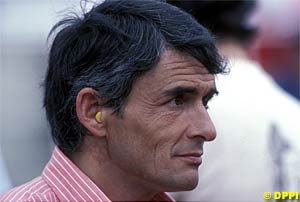 "I didn't know anything about tyres," he says, while the waiter brings us an assortment of desserts. "But I joined Michelin because cars and motorcycles interested me. So I was at first involved in research and development, trying to understand what happens when the tyre's patch is on the road, how it behaves, and things like that."
"I didn't know anything about tyres," he says, while the waiter brings us an assortment of desserts. "But I joined Michelin because cars and motorcycles interested me. So I was at first involved in research and development, trying to understand what happens when the tyre's patch is on the road, how it behaves, and things like that."
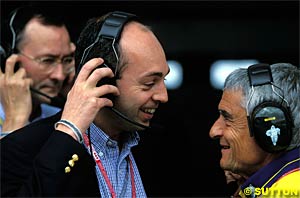 Dupasquier: "No! Not at all! We can leave whenever we want, easy. If our partners don't like us anymore, easy - we have the pretext like the unique tyres, that kind of rubbish, we can say, alright guys, sorry, we don't play anymore. Fine, it's no problem."
Dupasquier: "No! Not at all! We can leave whenever we want, easy. If our partners don't like us anymore, easy - we have the pretext like the unique tyres, that kind of rubbish, we can say, alright guys, sorry, we don't play anymore. Fine, it's no problem."
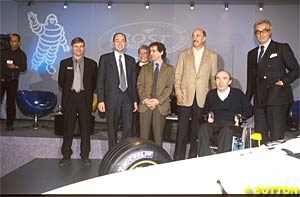 Dupasquier: "It's not that different. We always like to fight at the very top of motorsport in the world - the different disciplines. You get Le Mans for endurance, you get MotoGP, Rally world championship and Formula One. Because the company wants to fight, the company has that tradition of being competitive. That's why we don't like the single-manufacturer idea. It's fine for the smaller series, to make it cheap, but not for a world class motorsport.
Dupasquier: "It's not that different. We always like to fight at the very top of motorsport in the world - the different disciplines. You get Le Mans for endurance, you get MotoGP, Rally world championship and Formula One. Because the company wants to fight, the company has that tradition of being competitive. That's why we don't like the single-manufacturer idea. It's fine for the smaller series, to make it cheap, but not for a world class motorsport.
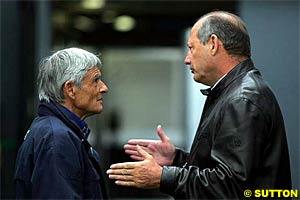 BG: Ford obviously decided that it's stopped being a good investment, and now I am wondering if Toyota is not next. When Toyota came into the sport, it was primarily for marketing reasons - they wanted to increase their road car sales in Europe. So I'm thinking, OK, in the first two-three years they get visibility and the marketing exercise works. But if they don't get results soon, they will leave
BG: Ford obviously decided that it's stopped being a good investment, and now I am wondering if Toyota is not next. When Toyota came into the sport, it was primarily for marketing reasons - they wanted to increase their road car sales in Europe. So I'm thinking, OK, in the first two-three years they get visibility and the marketing exercise works. But if they don't get results soon, they will leave
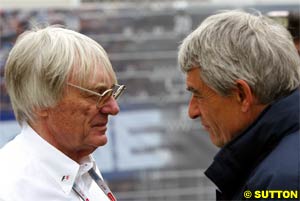 Dupasquier: "I like Frank [Williams] and Ron [Dennis] very much. With Ron, we had such a good learning curve together. He was young, we arrived to Formula One at the same time. And I like him very much, he's a great person. But of all time, as I said before, it was really Enzo Ferrari. I even wrote it in a book, because when he died I was in the United States and I realised that I did so many things with this man that nobody knew about it. I wrote a few reports after my visits to Maranello, but that was mainly technical stuff. The impressions, the relationship with him, nobody knew about it. So I began to write something."
Dupasquier: "I like Frank [Williams] and Ron [Dennis] very much. With Ron, we had such a good learning curve together. He was young, we arrived to Formula One at the same time. And I like him very much, he's a great person. But of all time, as I said before, it was really Enzo Ferrari. I even wrote it in a book, because when he died I was in the United States and I realised that I did so many things with this man that nobody knew about it. I wrote a few reports after my visits to Maranello, but that was mainly technical stuff. The impressions, the relationship with him, nobody knew about it. So I began to write something."
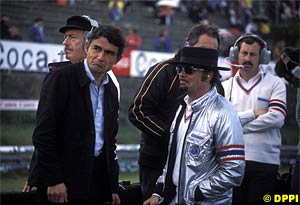 "Racing was a vocation, you did it because you wanted it, you were passionate about racing, you were doing it... but Bernie understood that the F1 concept was more than racing - it was an achievement - and that there's a possibility to make money out of it. Make money out of it! No one was thinking about that! Chapman was inventing active suspension, aerodynamics, everybody was working like hell day and night, and nobody was making money. To make money you have to bring spectators, and you have to have sponsors, and you have to be on TV. Bernie anticipated that. Being on TV then brings the sponsors... it's a circle that brings a lot of money.
"Racing was a vocation, you did it because you wanted it, you were passionate about racing, you were doing it... but Bernie understood that the F1 concept was more than racing - it was an achievement - and that there's a possibility to make money out of it. Make money out of it! No one was thinking about that! Chapman was inventing active suspension, aerodynamics, everybody was working like hell day and night, and nobody was making money. To make money you have to bring spectators, and you have to have sponsors, and you have to be on TV. Bernie anticipated that. Being on TV then brings the sponsors... it's a circle that brings a lot of money.
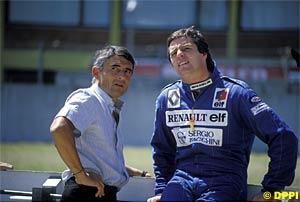 Dupasquier: "It's difficult to judge. We are now enjoying the benefit of many years of hindsight. I think you're half right, because I don't think the people of this century are not as good as others. But the situation has changed, society has changed. The same ethics, the same values are not worth anything anymore. If you are passionate, you just die, because you don't make money. In the past, you could be passionate, not make a lot of money, but survive. It's not possible anymore.
Dupasquier: "It's difficult to judge. We are now enjoying the benefit of many years of hindsight. I think you're half right, because I don't think the people of this century are not as good as others. But the situation has changed, society has changed. The same ethics, the same values are not worth anything anymore. If you are passionate, you just die, because you don't make money. In the past, you could be passionate, not make a lot of money, but survive. It's not possible anymore.
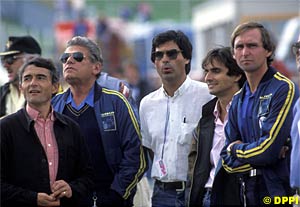 Dupasquier: "If there is nothing to discover, I'm not that excited. But if there's a new compound or new things and you're not sure if we match the conditions - ooooh! Then I'm eager to find out and you can see me running between teams, asking 'what did you put on your car? The A? The B? Hmmm', and I wait to see what the A and the B are doing."
Dupasquier: "If there is nothing to discover, I'm not that excited. But if there's a new compound or new things and you're not sure if we match the conditions - ooooh! Then I'm eager to find out and you can see me running between teams, asking 'what did you put on your car? The A? The B? Hmmm', and I wait to see what the A and the B are doing."
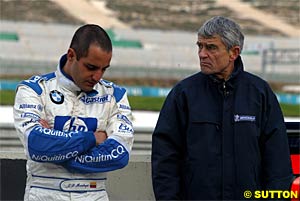 BG: Rossi??
BG: Rossi??
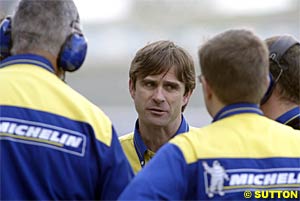 Dupasquier: "McLaren is on a rise, absolutely, and I expect them to be our strongest partner next year. But I'll tell you a secret - I go where I can see the three screens: one with the images and the two timing screens. Frank Williams has all three, whereas McLaren have two screens for the engineers, so that's why I go to Williams."
Dupasquier: "McLaren is on a rise, absolutely, and I expect them to be our strongest partner next year. But I'll tell you a secret - I go where I can see the three screens: one with the images and the two timing screens. Frank Williams has all three, whereas McLaren have two screens for the engineers, so that's why I go to Williams."
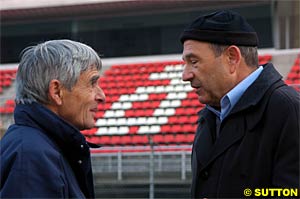 Dupasquier: "No, absolutely not. As far as I know - and I may not know everything - there is no such indication, and there's nothing coming from our partners to suggest that they are displeased with our service. And with Sauber now paying for our tyres as well, you just need to listen to what [Felipe] Massa and Peter Sauber had to say about their performance on the first day [of testing with Michelin, last week]. I was there [in Barcelona] on the second day, they did some laps the day before, but they were absolutely amazed.
Dupasquier: "No, absolutely not. As far as I know - and I may not know everything - there is no such indication, and there's nothing coming from our partners to suggest that they are displeased with our service. And with Sauber now paying for our tyres as well, you just need to listen to what [Felipe] Massa and Peter Sauber had to say about their performance on the first day [of testing with Michelin, last week]. I was there [in Barcelona] on the second day, they did some laps the day before, but they were absolutely amazed.
"Ohhhhh, we drink to you, not to Formula One!" Pierre exclaims.
"To friendship," I raise my glass.
"To friendship!"
Inevitably, every dinner has its leftovers. My dinner in Paris with Pierre Dupasquier had many, but just so you get a little taste of what it's like to listen to the man, below are three mp3 files of material not included in the written interviews (or, at least, not in full).
Bon appetite!
(47 seconds; 735kb)
(4 minutes and 51 seconds; 4.5mb)
(1 minute and 32 seconds; 1.4mb) |
|
Contact the Author Contact the Editor |
Please Contact Us for permission to republish this or any other material from Atlas F1.
|
Click here for Part I
Volume 10, Issue 48
Interview with Pierre Dupasquier (III)
Interview with Renault's Tech Chiefs
On the Road
Elsewhere in Racing
The Weekly Grapevine
> Homepage |
 To download, simply click on each link and save the file to your computer. After it finished downloading, unzip it and open the mp3 file in your choice of audio player.
To download, simply click on each link and save the file to your computer. After it finished downloading, unzip it and open the mp3 file in your choice of audio player.